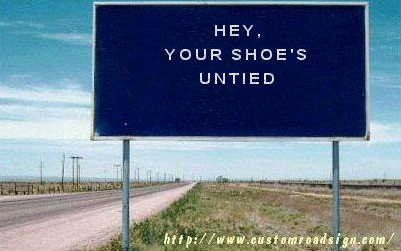
Design your own custom road sign at customroadsign.com.

Design your own custom road sign at customroadsign.com.
siagonology
n. the study of jawbones
“I mean, it’s a great story. It’s got some great things in it. I mean, there’s something like eight violent deaths.” — Mel Gibson, on reasons to like Hamlet

The average lightning bolt carries enough energy to light a 100-watt light bulb for two months.
In 1955, the merchant vessel Joyita disappeared en route from Samoa to the Tokelau Islands, about 270 miles away.
A search and rescue mission found nothing, but five weeks later she was sighted more than 600 miles from her scheduled route. The ship was partially submerged and there was no trace of her 16 crewmembers or 9 passengers, including two children.
An inquiry found that the disappearance of the passengers and crew was “inexplicable on the evidence submitted.” But the Fiji Times and Herald quoted an “impeccable source” saying that the Joyita had passed through a fleet of Japanese fishing boats and “had observed something the Japanese did not want them to see.”
What was it? No one knows.
Web sites with a Google PageRank of 10:
And, of course, Google itself.

Most people know that Yellowstone National Park is geologically active, but few realize that it sits atop a gigantic volcano. No one knows when it will blow next, but past eruptions have been huge, up to 2,500 times the size of Mount St. Helens in 1980. Today that would kill millions and change the worldwide climate catastrophically.
For now, we just have to wait — the problem is far too big for today’s engineers to tackle.
Most common surnames in the United States …
… and in the United Kingdom:
The world record for going without sleep was set in 1965 by 17-year-old high school student Randy Gardner, who stayed awake for 264 hours, or 11 days.
He spent it playing pinball.

Like mermaids, trolls probably joined the culture when people misperceived perfectly natural phenomena. This one “lives” on the coast of the island of Hamarøy in Norway.